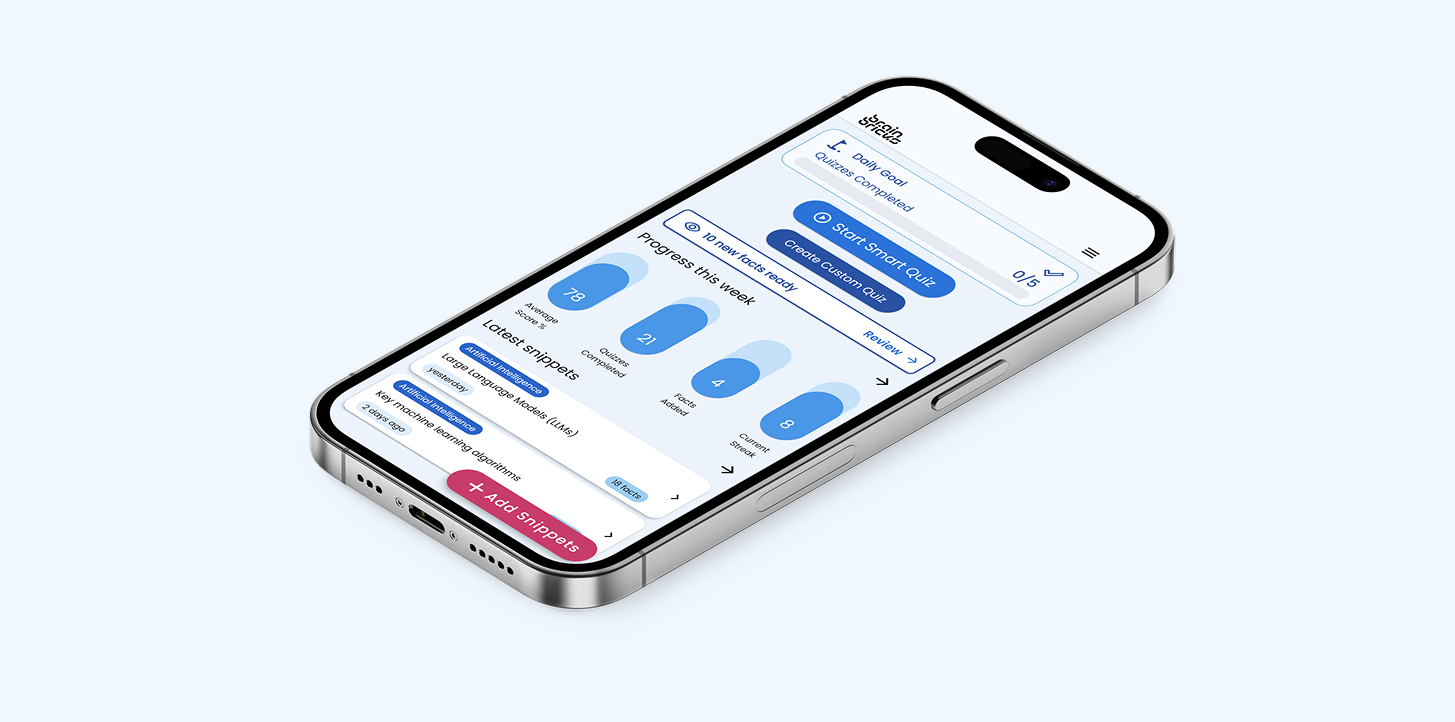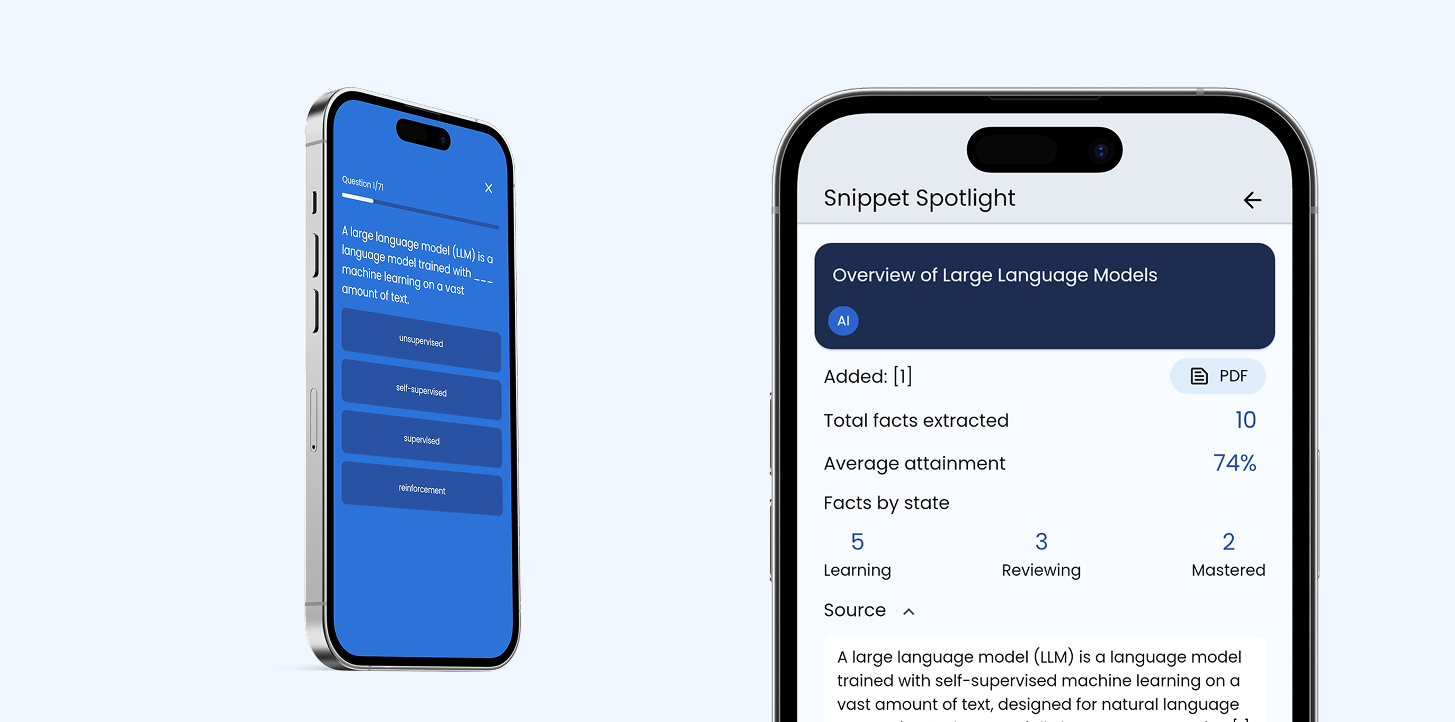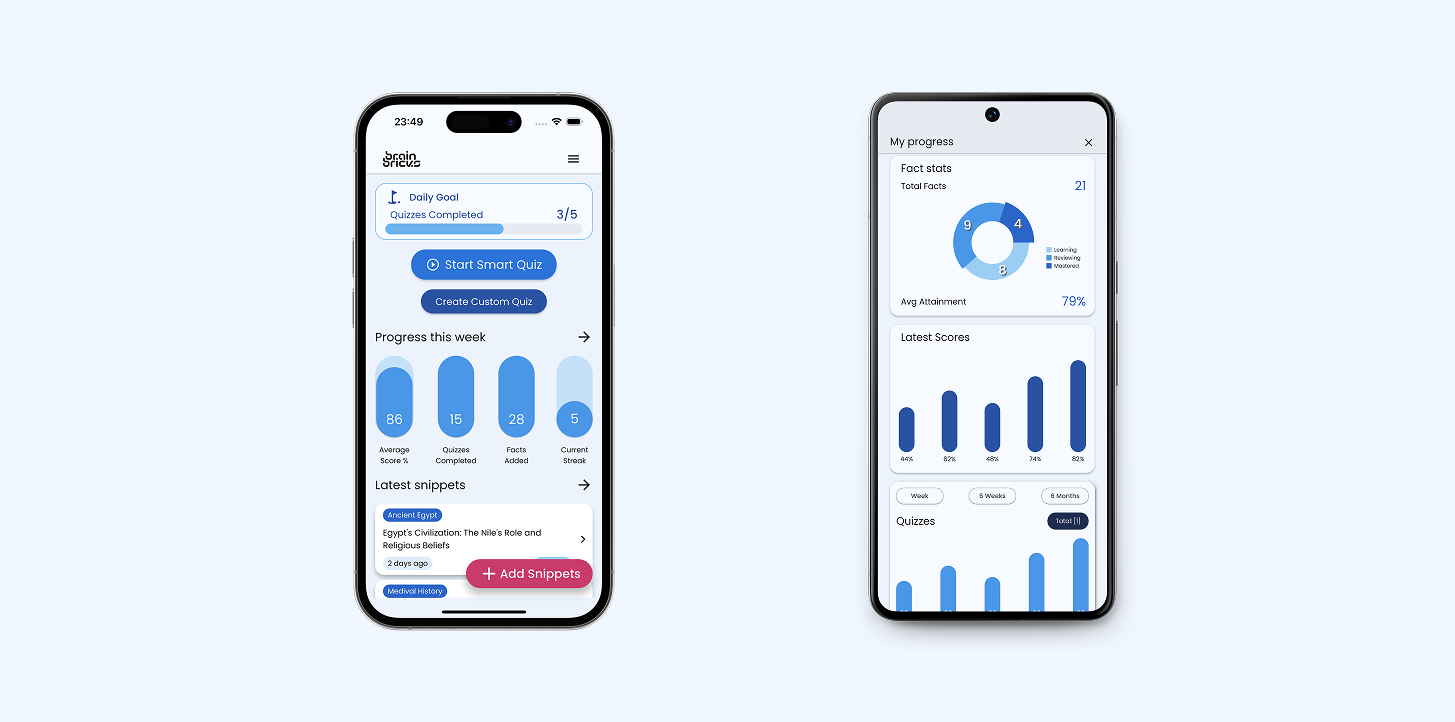How to Turn Any Content Into Long-Term Knowledge: The Brain Bricks Method

How to Turn Any Content Into Long-Term Knowledge: The Brain Bricks Method
What if you could remember 80% more from everything you study? What if instead of cramming the same material over and over, you could transform any piece of information into lasting knowledge that stays with you months—even years—later?
That's exactly what we built Brain Bricks to do.
The Content-to-Knowledge Transformation
At the heart of effective learning is a simple but powerful principle: quality over quantity. Instead of trying to process entire textbooks or lengthy articles, Brain Bricks focuses on the information that truly matters.
Here's how the transformation works:
Step 1: Strategic Content Selection
Rather than overwhelming you with everything, Brain Bricks accepts focused text snippets—the 20% of material that drives 80% of understanding. You choose exactly what deserves your mental energy.
Example Input:"Marie Curie was the first woman to win a Nobel Prize and remains the only person to have won Nobel Prizes in two different scientific fields: Physics and Chemistry."
Step 2: AI-Powered Question Generation
Within seconds, Brain Bricks transforms this single sentence into multiple targeted questions that approach the concept from different angles:
- Who was Marie Curie?
- What was she the first woman to achieve?
- In which two fields did she win Nobel Prizes?
- Who is the only person to have won Nobel Prizes in both Physics and Chemistry?
Each question requires active recall—forcing your brain to retrieve information rather than simply recognize it.
Step 3: Adaptive Difficulty Scaling
As you answer questions, the system learns your knowledge level and adjusts accordingly:
- Too easy? Questions become more challenging, asking you to apply concepts in new contexts
- Too difficult? The system provides simpler prompts and increases review frequency
- Just right? Intervals between reviews extend as your mastery grows
Let's see another example in action:
Input:"Mount Everest, located in the Himalayas on the border of Nepal and China, is the highest mountain on Earth, reaching a peak of 8,849 meters above sea level."
Generated Questions:
- What is the highest mountain on Earth?
- How high is Mount Everest?
- Where is Mount Everest located?
- What mountain range contains Mount Everest?
- Which two countries share Mount Everest's border?
Beyond Simple Question Generation: Smart Learning Features
Intelligent Organisation System
Brain Bricks gives you complete control over how knowledge is organised:
- Personal Categories: Create systems that match your thinking and course structure
- Importance Levels: Mark concepts as high, medium, or low priority based on your goals
- Flexible Adaptation: Reorganise as your understanding evolves
- Easy Management: Simple interface for editing and organising your knowledge base
This manual control ensures your learning system reflects your actual needs, not some generic algorithm's assumptions.
Multiple Question Types for Deeper Understanding
The platform generates various question formats to strengthen different aspects of memory:
Multiple Choice: Tests recognition and eliminates obvious wrong answers
Which scientist won Nobel Prizes in both Physics and Chemistry?
A) Albert Einstein
B) Marie Curie
C) Isaac Newton
D) Charles Darwin
A) Albert Einstein
B) Marie Curie
C) Isaac Newton
D) Charles Darwin
Fill in the Blanks: Requires precise recall of specific details
Marie Curie was the first woman to win a _____ and remains the only person to have won in two different scientific fields: _____ and _____.
True/False: Tests precise understanding
True or False: Marie Curie won Nobel Prizes in Physics and Biology.
Statement Selection: Identifies the single correct statement among similar options
Which statement about Marie Curie is correct?
A) She won Nobel Prizes in Chemistry and Medicine
B) She was the second woman to win a Nobel Prize
C) She won Nobel Prizes in Physics and Chemistry
D) She won three Nobel Prizes in different fields
A) She won Nobel Prizes in Chemistry and Medicine
B) She was the second woman to win a Nobel Prize
C) She won Nobel Prizes in Physics and Chemistry
D) She won three Nobel Prizes in different fields
Spaced Repetition That Actually Works
The system calculates optimal review timing by considering:
- Time since last review: How long has it been since you saw this concept?
- Performance history: How quickly and accurately have you answered related questions?
- Importance weighting: How critical did you mark this information?
- Category distribution: Are you neglecting certain subject areas?
Instead of arbitrary scheduling, you get scientifically optimized review sessions.
Custom Quiz Creation: Targeted Learning When You Need It
Beyond the core algorithm that optimizes your entire knowledge base, Brain Bricks allows focused study sessions:
Preparing for a specific exam? Create custom quizzes covering only relevant topics while maintaining your broader knowledge base through the main algorithm.
Need to master a particular concept? Deep dive into challenging areas with targeted practice sessions.
Want comprehensive review? Let the algorithm guide you through balanced content coverage.
This flexibility means you can adapt your study approach to immediate needs while building long-term retention.
Smart Notifications: Your Personal Learning Coach
Unlike generic study reminders, Brain Bricks provides intelligent guidance:
Personalized Scheduling: Notifications based on your actual learning patterns and availability, not arbitrary timing.
Saturation Analysis: The system monitors your knowledge base and recommends when to continue intensive review versus when strategic breaks would be more beneficial.
Effectiveness Tracking: Analytics on your retention rates and learning progress, with suggestions for optimizing your study schedule.
Performance Insights: Identification of your most productive study times based on your response patterns and accuracy rates.
Real Learning Analytics: See Your Progress
Brain Bricks provides detailed insights that help you understand and optimize your learning:
- Retention Rate Tracking: See exactly how much you're retaining across different categories
- Performance Improvement Metrics: Track your progress over time with detailed analytics
- Knowledge Base Growth: Monitor how your curated content library develops
- Category Performance: Identify strong subject areas and topics needing more attention
- Response Pattern Analysis: Understand your personal learning rhythms and preferences
This data transforms from guesswork into informed optimisation of your study approach.
The Competitive Advantage: Why This Method Works
Traditional flashcards create the illusion of knowledge through recognition. Brain Bricks builds genuine understanding through retrieval practice—the same cognitive process you'll use in exams, interviews, and real-world applications.
Students using Brain Bricks report:
- Better exam performance through systematic, long-term preparation instead of last-minute cramming
- Reduced study anxiety from knowing exactly what they've mastered and what needs work
- More efficient study sessions focused on actual knowledge gaps rather than busy work
- Enhanced focus through quality-over-quantity content curation
- Improved retention lasting months beyond the original learning session
Getting Started: From Information Overload to Knowledge Mastery
The transformation from passive information consumer to active knowledge master begins with a simple shift: curation over consumption.
Instead of trying to study everything, Brain Bricks forces you to identify what truly matters. This selectivity isn't limiting—it's liberating. When you focus on essential concepts and let the system handle optimal review scheduling, you free your mental energy for actual learning rather than administrative overhead.
Whether you're tackling organic chemistry, medieval literature, or quantum physics, the process remains the same:
- Select high-value content that forms the foundation of understanding
- Let AI generate varied questions that promote genuine recall
- Trust the spaced repetition algorithm to schedule optimal review timing
- Use analytics to identify what's working and what needs adjustment
- Build gradually towards comprehensive mastery
The Bottom Line
Brain Bricks doesn't just help you study—it revolutionizes how you learn. By automating the proven science of active recall and spaced repetition while keeping you focused on truly important content, it transforms the fundamental relationship between effort and results.
The question isn't whether you'll study. The question is whether you'll study in a way that creates lasting knowledge or temporary familiarity.
Your future self—the one walking confidently into exams with deep understanding and reliable recall—will thank you for choosing the method that actually works.

Why Traditional Study Methods Are Failing Students (And What Actually Works)

How to Turn Any Content Into Long-Term Knowledge: The Brain Bricks Method






